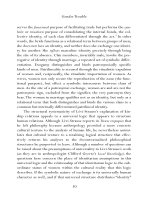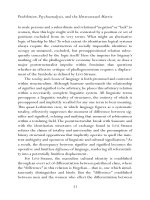GENDER TROUBLE 91
Bạn đang xem bản rút gọn của tài liệu. Xem và tải ngay bản đầy đủ của tài liệu tại đây (20.65 KB, 1 trang )
Gender Trouble
“What is/has being?” to the prior question “How is ‘being’ instituted
and allocated through the signifying practices of the paternal economy?” The ontological specification of being, negation, and their relations is understood to be determined by a language structured by the
paternal law and its mechanisms of differentiation. A thing takes on the
characterization of “being” and becomes mobilized by that ontological
gesture only within a structure of signification that, as the Symbolic, is
itself pre-ontological.
There is no inquiry, then, into ontology per se, no access to being,
without a prior inquiry into the “being” of the Phallus, the authorizing
signification of the Law that takes sexual difference as a presupposition
of its own intelligibility. “Being” the Phallus and “having” the Phallus
denote divergent sexual positions, or nonpositions (impossible positions, really), within language. To “be” the Phallus is to be the “signifier” of the desire of the Other and to appear as this signifier. In other
words, it is to be the object, the Other of a (heterosexualized) masculine desire, but also to represent or reflect that desire.This is an Other
that constitutes, not the limit of masculinity in a feminine alterity, but
the site of a masculine self-elaboration. For women to “be” the Phallus
means, then, to reflect the power of the Phallus, to signify that power,
to “embody” the Phallus, to supply the site to which it penetrates, and
to signify the Phallus through “being” its Other, its absence, its lack, the
dialectical confirmation of its identity. By claiming that the Other that
lacks the Phallus is the one who is the Phallus, Lacan clearly suggests
that power is wielded by this feminine position of not-having, that the
masculine subject who “has” the Phallus requires this Other to confirm
and, hence, be the Phallus in its “extended” sense.13
This ontological characterization presupposes that the appearance
or effect of being is always produced through the structures of signification. The Symbolic order creates cultural intelligibility through the
mutually exclusive positions of “having” the Phallus (the position of
men) and “being” the Phallus (the paradoxical position of women).The
interdependency of these positions recalls the Hegelian structure of
56









